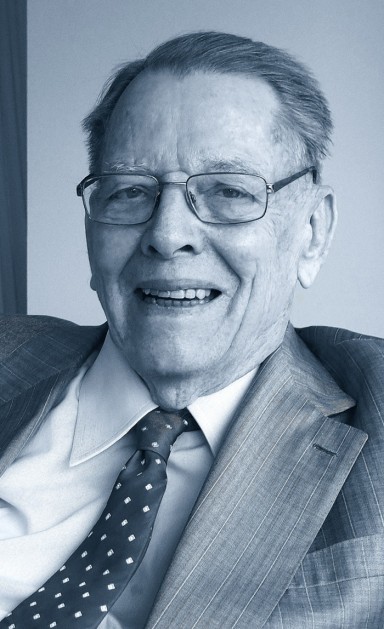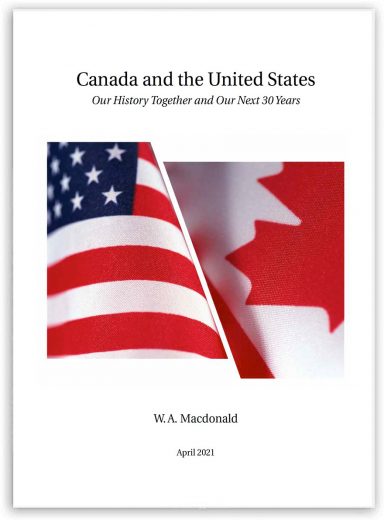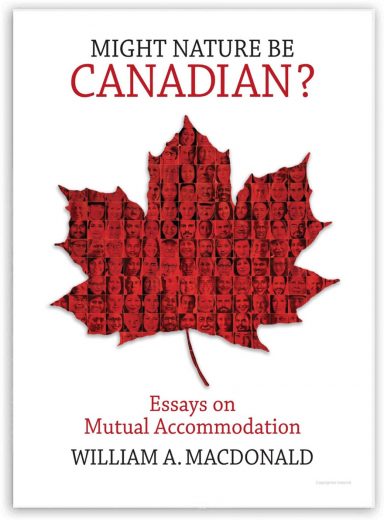
Biographical Notes
William (Bill) Atwood Macdonald was born and raised in Montreal. He graduated from McGill University, then left for Toronto at age 20 to study law at Osgoode Hall.
Bill practised law for 42 years, 20 of those as senior partner at McMillan Binch in Toronto. His client relationships included the Royal Bank of Canada, Algoma Steel, Honda, and the Ontario government during the Robarts and Davis eras. In 1976, Bill recruited John Turner to the firm after Turner stepped down as Canada’s finance minister (he would go on to become the country’s 17th prime minister in 1984).
In 1993, Bill left McMillan Binch (now McMillan) to establish W.A. Macdonald Associates Inc. Its focus is on government relations, economic policy, and the Canadian and global economic/political/policy environment. He has been involved for over fifty-five years in a very broad range of policy issues for governments and business, as well as specific major projects involving both provincial and the federal governments.
He leads two small CEO groups which he started approximately four and three decades ago, respectively—one on Canadian economic policy and one on the North American and global economy.
From the 1970s through the mid‑1980s, Bill advised the Ontario government on several major public matters, including the province’s fight against the 1969 federal tax reform white paper; the seizure of five loan and trust companies; and the province’s $100‑million investment in the Syncrude tar sands, which kept the project alive at a critical time.
He has extensive experience consulting on resource projects, among them the Alcan Kemano expansion proposal in B.C.; fighting Ottawa over the National Energy Program on behalf of Imperial Oil and the oil independents; and acting for the five remaining private sector potash producers in Saskatchewan to help them resist takeover. His latest major resource project was advising Inco on its vast nickel mine interests in Voisey’s Bay, Newfoundland and Labrador.
He represented the three basic steel producers in Ontario and five of its largest mining companies, defending against the 1969 federal tax reform white paper. He was instrumental in helping the Business Council on National Issues to shape the final competition law after a 12-year battle. He also acted for various groups of individual companies on wide-ranging policy issues, such as securities reform, class action lawsuits, competitive after-tax financing, corporate tax consolidation, and inflation accounting.
Bill served as chairman of the Canadian Institute of Chartered Accountants Commission, which produced The Report of the Commission to Study the Public’s Expectations of Audits (the Macdonald Commission Report, 1988). On the recommendation of John Deutsch—former chairman of the Economic Council of Canada, and then-principal of Queen’s University—he was named a special taxation adviser in 1971-73 to the Bermuda government. It later credited his report for putting them into the black when almost all other countries were still heavily in the red.
In the aftermath of the federal wage and price controls in 1976, Bill was appointed by Ontario premier William Davis to a new committee on the Economic Future of Ontario, chaired by the premier; and later by the minister of labour to a new joint management-labour committee on the Quality of Working Life, chaired by the minister. He also served on a three-member committee set up by Premier Davis to advise on senior public service salaries.
Bill was a director of Imperial Oil for 21 years and National Trust for 35 years, as well as of Rio Algom and Marathon Realty. He was an adviser to Honda in Japan, Canada, the U.S., and the U.K., and was instrumental in having the discriminatory Autopact with the U.S. overturned at the WTO in Geneva.
Stemming from his early life in Montreal, he has a long personal experience and history-based understanding of Quebec. He retains significant relationships within the province’s senior business and political ranks and senior journalists. Today his network is global, and his friendships include former central bankers and leading economic and political journalists in New York, London, Ottawa, and Washington, D.C.
Bill has had a very long business experience with Japan. He was founding vice-chairman and later chairman of the Japan Society in Canada. He and his wife Molly Anne have spent more than a year of their lives in Japan over a span of 35 years. They have put together a unique collection of 17th-century Kakiemon export porcelain and the 18th-century English and European porcelain influenced by it, alongside a cross-section of 17th-century Shoki-Imari, Nabeshima, Ko-Kutani and Arita porcelain made during the same period for domestic Japanese use. Documented in a book titled Dragons, Tigers and Bamboo (2009), much of the collection now resides in a special gallery at the Gardiner Museum of Ceramic Art in Toronto, where it is intended the entire collection will end up.






